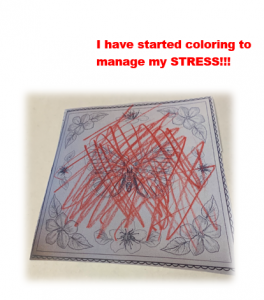 What is Stress Anyway?
What is Stress Anyway?
The traffic is awful, a report is due, the laundry is piling up, and the kids are fighting. Life is full of stress! According to the National Institute of Mental Health, stress is how the brain and body respond to any physical, mental, and/or emotional demand. Not all stress is bad. For example, stress can help motivate us to get things done. When faced with a threat or stressful event, our bodies produce hormones such as epinephrine, which can cause a temporary rise in our heart rate and blood pressure. Chronic, un-managed stress can cause long-term symptoms including headaches, high blood pressure and even problems sleeping.
Identify the Sources of Stress in Your Life
Feeling stressed is normal, but some people cope with stress better than others. Our thoughts, lifestyle and emotions can affect how much stress we endure. We must identify the causes of our stress before we can begin to manage them. Although the causes of stress are similar for both men and women, it is how we recognize and manage our stress that makes us different.
Common Causes of Stress:
• Work or unemployment
• Money, finances
• Drug or alcohol abuse
• Family breakdown
• Health issues
• Major life changes
What are the Symptoms of Stress?
Our bodies automatically respond to stressors in our lives. However, constant and uncontrolled stress can lead to serious physical and mental consequences. No matter how stressful your life seems, we must recognize the warning signs of stress and take action.
Watch out for the following warning signs:
• Feeling tired, not sleeping properly
• Loss of concentration and an inability to complete projects
• Irritability, low self-esteem or mood swings
• Feeling tense or anxious
• Feeling unmotivated
• Withdrawing from family and friends
• Excessive drinking and/or drug use
• Physical signs such as headaches, chest pains, high blood pressure, digestive problems or aches and pains
Men and Woman Handle Stress Differently
How stress affects you may depend upon your gender. Men and women recognize and react to stress in different ways, both mentally and physically.
When feeling stressed, women reach out to friends and family. They seek support to lower their stress and find a solution to their challenges. By talking about their emotions, women are able to process their feelings and share the pressure of their situation.
When men experience stressful situations, they are likely to hide their feelings or change the subject to escape a stressful situation. Men find it hard to talk about their feelings or ask for help when faced with pressures from their job, family issues or money worries. Men prefer to play sports or listen to music to manage stress.
Stress Reduction Strategies for Men and Women
Stress is a normal part of life, but chronic stress can be bad for our health. Stress management means taking control of your thoughts, emotions, and lifestyle. Making simple changes in your life such as maintaining a network of close friends, exercising, eating a healthy diet, and getting enough sleep can help reduce your overall stress.
Resources:
The American Psychological Association: https://www.apa.org/news/press/releases/stress/2010/gender-stress
The National Institute of Mental Health: https://www.nimh.nih.gov/health/publications/stress/index.shtml
The Electronic Data Information Source of UF/IFAS Extension. EDIS: https://edis.ifas.ufl.edu/pdffiles/FY/FY51700.pdf
To learn more about how to cope with stress, contact Laurie Osgood, Family and Consumer Sciences Agent at the UF/IFAS Extension Office in Gadsden County (850) 875-7255 or Osgoodlb@ufl.edu
- Don’t Get Scammed - April 10, 2023
- September is Food Safety Education Month - September 28, 2022
- Meet Your FCS Agent: Laurie Osgood - August 2, 2022

